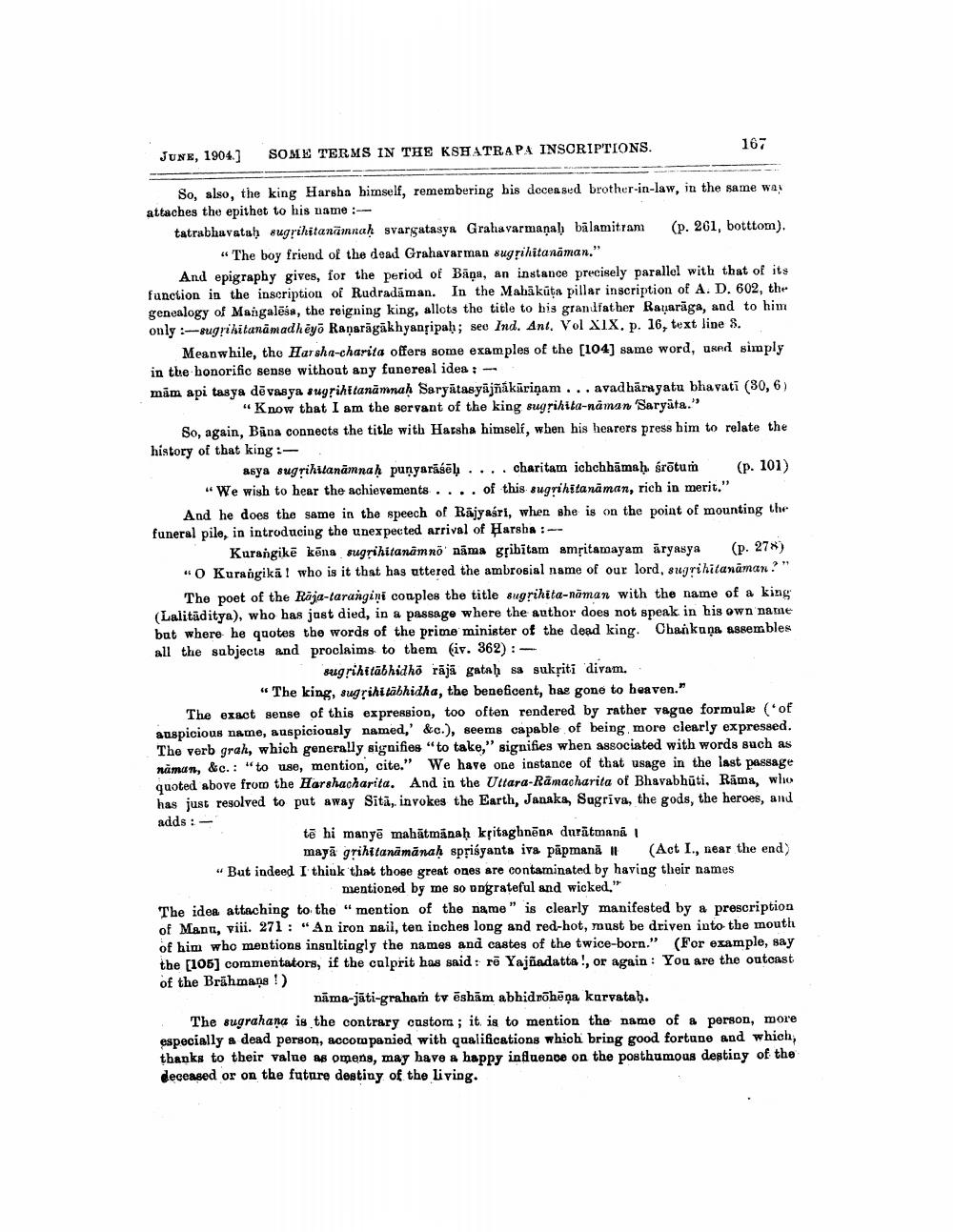________________
JUNE, 1904.)
SOME TERMS IN THE KSHATRAPA INSCRIPTIONS.
167
So, also, the king Harsha himself, remembering his deceased brother-in-law, in the same way attaches the epithet to his name :tatrabhuvatah sugrihitanämnak svargatasya Grahavarmanah balamitram (p. 201, botttom).
"The boy friend of the dead Grahavarman sugrihitanaman." And epigraphy gives, for the period of Bāņa, an instance precisely parallel with that of its function in the inscription of Rudradāman. In the Mahakūta pillar inscription of A. D. 602, the genealogy of Mangalēsa, the reigning king, allots the title to his grandfather Ratarāga, and to him only sugrikitanāmadhēyö Raņarāgākhyansipah; seo Ind. Ant. Vol XIX. p. 16, text line 8.
Meanwhile, the Harsha-charita offers some examples of the [104] same word, used simply in the honorific sense without any funereal idea : - mām api tasya dēvasya sugrihitanămnah Saryātasyājñákāriņam ... avadharayata bhavati (30, 6)
"Know that I am the servant of the king sugrihita-naman 'Saryata." So, again, Bana connects the title with Harsha himself, when his hearers press him to relate the history of that king :
asya sugrihilanämnah punyarisch .... charitam ichchhamoh śrötum (p. 101) "We wish to hear the achievements .... of this sugrihitanaman, rich in merit." And he does the same in the speech of Rajyasri, when she is on the point of mounting the funeral pile, in introducing the unexpected arrival of Harsha:
Kurangikē kēna sugrihitanamnē nāma gribitam amritamayam aryasya (p. 278) "O Kurangikā! who is it that has uttered the ambrosial name of our lord, sugrihitanaman?"
The poet of the Rõja-tarangini couples the title sugrihita-rāman with the name of a king (Lalitāditya), who has just died, in a passage where the author does not speak in his own name but where he quotes the words of the prime minister of the dead king. Chankaņa assembles all the subjects and proclaims to them liv. 362): -
sugrihitābhidho rājā gataḥ sa sukriti 'divam. “The king, sugrihitābhidha, the beneficent, has gone to heaven." The exact sense of this expression, too often rendered by rather vague formulæ (of auspicious name, auspiciously named,' &c.), seems capable of being more clearly expressed. The verb grah, which generally signifies "to take," signifies when associated with words such as naman, &c. : "to use, mention, cite." We have one instance of that usage in the last passage quoted above from the Harshacharita. And in the Uttara-Ramacharita of Bhavabhūti, Räms, who has just resolved to put away Sita, invokes the Earth, Janaka, Sugriva, the gods, the heroes, and adds :
tē hi manyē mahātmanaḥ kritaghnēna durātmana
mayā grihitanamāna) spriấyanta iva påpmană It (Act I., near the end) But indeed I think that those great ones are contaminated by having their names
mentioned by me so ungrateful and wicked." The idea attaching to the mention of the name" is clearly manifested by a prescription of Manu, viii. 271: "An iron nail, ten inches long and red-hot, must be driven into the mouth of him who mentions insultingly the names and castes of the twice-born." (For example, say the [105] commentators, if the calprit has said : rē Yajñadatta!, or again : You are the outcast of the Brāhmans !)
nama-jāti-graham tv ēshăm abhidrõhēņa karvatah. The sugrahana is the contrary custorg; it is to mention the name of a person, more especially a dead person, accompanied with qualifications which bring good fortune and which, thanks to their value as omens, may have a happy influence on the posthumous destiny of the deceased or on the future destiny of the living.




